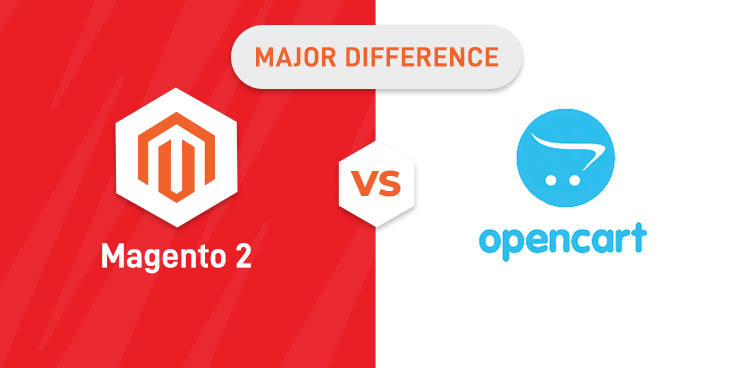Comparison between Magento and Opencart – which is better

by ss_sgp
The main purpose of the services
As mentioned above, both systems are aimed at online trading. In both cases, the target categories are small and medium-sized businesses looking for a functional online store. But the approach to the formation of this very online store is different for both CMS.
CMS Magento
Magento is a reliable enterprise tool with good commercial support. The main product of the developers is a cloud service designed for commercial use only. Prices for launching and maintaining online stores on the cloud platform are not the most welcoming. But on the other hand, the business receives a scalable tool that can grow with the company and cope even with very heavy loads and complex tasks.
Standalone solution (CMS distribution that can be downloaded and installed on your server) is a “trial version”. You can examine the source code, make sure the engine is working well, etc. But launching a project on it, even taking into account the fact that the Magento Open Source version can be downloaded for free, will cost a round sum. The costs will be associated with the hiring of specialized specialists who will create an individual store design and set up integration with the necessary services.
You probably won’t be able to figure it out on your own, as is the case with popular engines. It is a complex CMS for large projects.
CMS OpenCart
OpenCart is a classic representative of popular open-source products. There is an established community here, a large variety of information materials (setup guides, developer documentation, thematic blogs, etc.). The engine is actively developing in different languages. As a result – a huge number of add-ons and themes, paid and free, a choice of specialized specialists and freelancers with reasonable prices.
If you wish, you can sort out all the questions yourself, without the involvement of professional support and support services. OpenCart allows you to run complex and functional projects that can grow to impressive sizes. But this engine will never get the status of a serious commercial tool that will be used by corporate clients.
Comparing functionality
Both CMS offer professional support and cloud service. But in the case of Magento, this is a powerful platform for large corporate clients (the company’s key product), and for OpenCart, this is one of the ready-made hosting options. Nothing prevents you from installing the engine on any hosting, even if it is a dedicated server or a complex cloud infrastructure.
How the engines are similar:
Both run on PHP, so they can be installed on various types of hosting, including shared.
Both support the installation of add-ons and templates. There is an official catalog.
They work with several interface languages, support the formation of prices in several currencies.
The basic delivery (“out of the box”) contains the most popular tools: catalog, payment acceptance functionality, coupon / discount system, etc.
But, with the general similarity, each item has its own nuances. Shared hosting for Magento will clearly not be enough, the distribution kit alone in zipped form takes more than 170 MB (with demo data and more than 300 MB), from the recommended requirements – the presence of a swap file, PHP at least 7.3 and 2 GB of RAM, the presence of specific modules (for example, the Composer package manager, etc.). Although you can find special hosting for Magento on the network, it will be a kind of “crutch” for the first time, since the engine is designed at least for virtual or dedicated servers with a wide list of pre-installed software.
Installation and interface.
The OpenCart interface looks simpler and more intuitive, there is the ability to customize individual user roles.
SEO functionality
Magento has very wide SEO capabilities even in the basic version of the engine. OpenCart also has the most necessary tools, including manual input of CNC (human-readable URLs), but there are also known problems (for example, when manually editing addresses, you can accidentally create duplicates when different pages are listed under the same address, etc.). etc.).
To add more sophisticated SEO features, such as automatic generation of meta tags, you can use add-ons from the catalog. Both CMSs have a fair amount of plugins.
Other nuances
Safety. Despite the fact that OpenCart is not among the CMS leaders in terms of the number of hacked sites, its approach to security is more shaky. The first weak point is the lack of proper control of third-party extensions even in the official directory. The second point is the absence of a second authorization factor.
Magento has two-factor authentication, high-quality control of the security of add-ons in the official catalog, and a large number of built-in security tools and policies.
Server load. Based on the minimum hosting requirements, Magento loses. This plan is much easier for OpenCart. But if we talk about highly loaded projects, with a large number of add-ons and products in the catalog, then Magento wins. This CMS is designed specifically for large online stores.
Multisite / multi-store.
Supported by both CMS.
Compare tariff plans
Magento Open Source and OpenCart are completely free. But we are talking about the engine itself. To launch an online store with minimal functionality, it should be enough. However, this is extremely rare. The owner will want a unique interface, automatic selection of related products, etc. And plugins and templates are already responsible for this. Since they affect the total cost of site ownership, they will be discussed separately below.
When it comes to the cost of buying a domain and SSL certificates, there is full parity here.
Magento will definitely require more efficient hosting (VPS or dedicated server is best). It is better to entrust the setup and launch to professionals right away.
With OpenCart, even shared hosting is enough for the first time. If you have no experience with installation, choose a hoster with the ability to install a CMS in one click – for example, Bluehost.
Cost of templates
OpenCart Templates
You can find good free templates for OpenCart – you can buy them in the official catalog or on alternative sites. In most cases, we are talking about a price range of 20-100 US dollars.
Magento templates
There are only 10 design templates available for Magento in the official catalog, of which only 1 is free. The cost of the rest ranges from $ 70-500. On alternative specialized sites, you can find lots of 50-300 USD. It should be noted here that Magento focuses primarily on the individual development of the store interface.
Extensions / plugins cost
Extending eCommerce functionality of OpenCart
You can find a huge number of functional plugins for OpenCart completely free of charge. Paid solutions will cost an average of 20-100 USD, although the cost of individual copies can reach 200-300 USD.
Extending Magento eCommerce functionality
There are free extensions for Magento too. But about a third of the extensions in the catalog cost more than 120 USD. The cost of individual lots can reach several thousand US dollars.
What is the best choice for an online store
If in the world Magento accounts for about 8% of online stores (second only to WooCommerce and Shopify), then in Russia Magento is not even in the top 10 in popularity. What does it do? The fact that it will be difficult to find developers and specialized specialists to launch and support in the case of Magento. And in the case of OpenCart, there are definitely specialists, the prices for their services fluctuate within reasonable limits.
The choice for small businesses is obvious – it’s better to rely on a proven popular solution than on a quality implementation that you will not be able to implement and maintain.
In this situation, it is irrational to compare the basic functionality and requirements for hosting. Although it is worth mentioning that the adaptation of OpenCart is many times better than that of Magento.
Conclusions
You can argue for a long time about which engine to choose for an online store, but the realities of the market are such that you will have to invest well in the launch process if you bet on Magento, even if it is a free opensource version. Despite the fact that Magento handles the load better, has a sufficient number of additional modules and even reasonable prices for templates, this CMS is only suitable for very large projects with a sufficient budget and its own development team.
If you want to try your hand at online commerce, you have a limited budget and you need a product based on the principle of “cheap and cheerful”, then this is definitely OpenCart. It can even be run on shared hosting, ready-made solutions for integrating popular e-commerce services can be found for it, and prices for developer services are more than affordable.
Recommended Posts

Advantages and Disadvantages of WooCommerce
13.08.2020

System and Magento Support
10.08.2020
